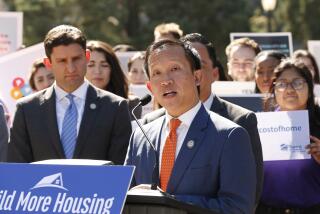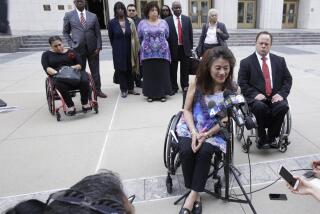Group Says Census Pact Has Been Sabotaged : 1990 count: Cities and states, including L.A. and California, vow to return to court to ensure a complete population estimate.
- Share via
A 2-year-long legal battle over how best to count minorities, immigrants and poor people in the 1990 census appears headed back to court as a group of cities and states, including Los Angeles and California, have accused the Bush Administration of sabotaging a court-sanctioned agreement aimed at achieving a complete count.
Los Angeles City Atty. James K. Hahn, along with Atty. Gen. John K. Van de Kamp and officials from New York City, Chicago, Houston and Miami, announced Wednesday that they will seek to reopen the lawsuit they filed in 1988 to force the U.S. Commerce Department, which oversees the Census Bureau, to adjust the census in a manner designed to catch many people, particularly poor city dwellers, who have been missed by the census in the past.
Hahn, Van de Kamp and the other plaintiffs in the lawsuit contend that the Commerce Department has failed to live up to its end of a settlement, reached last summer, spelling out the conditions under which the census would be adjusted. Commerce Department officials countered that their actions have been “fully consistent with the settlement agreement.”
The issue is an important one to cities because much of the financial aid they receive for housing and social services is based on population estimates provided by the census. The same estimates determine the number of elected representatives cities send to state legislatures and to Congress.
The issue has partisan overtones because big cities tend to be Democratic strongholds and the current Administration is Republican.
In a statement, Hahn contended: “The willful failure of Commerce Department officials to take all the steps available to ensure the most accurate census, and their efforts to avoid an accurate count of minorities and the impoverished violates the one-person, one-vote provision of the Constitution.”
According to Hahn, a 1986 test census revealed that 4.6% of Los Angeles residents had not been counted in the 1980 census. The city’s undercount of black and Latino residents was nearly 10%, Hahn said. Nationwide, the Census Bureau estimated an undercount of only 1.4%.
Hahn said Los Angeles “may face a population undercount of historic proportions in 1990.” City officials in the past have said that Los Angeles could lose $150 million in state and federal aid over the next decade if the undercount is as high in this year’s census as it was in 1980.
At a press conference in Sacramento on Wednesday, Van de Kamp said 3% of the state’s population was missed in 1980 and that a similar undercount this year would omit 900,000 people and could cost the state two congressional seats.
Census Bureau officials acknowledge that the undercount has been higher in cities among poor and minority residents who may not have fixed addresses or who avoid being counted out of fear, mistrust or ignorance of the census.
Where disagreement has arisen, however, is over the techniques used to count those who are hardest to count. Hahn and the other plaintiffs in the lawsuit argue that the Census Bureau is being blocked--for political reasons by the Commerce Department--from using a method of random sampling known as a post-enumeration survey. The survey would be used to pick up people missed in the initial head count, which began last month with the first comprehensive attempt to count the nation’s homeless.
“There’s no question that politics entered into the decision-making process by the Commerce Department,” Hahn said.
The dispute over the undercount appeared to be resolved last summer when a federal district judge in New York City approved a plan requiring the Commerce Department to draw up a set of guidelines under which the post-enumeration survey could be used to adjust the census. Published last month, the guidelines were condemned by the plaintiffs who said that they amounted to a rationale for not doing the adjustment. According to Hahn, the plaintiffs are asking presiding U.S. District Judge Joseph McLaughlin to throw out the guidelines.
Commerce Department officials on Wednesday defended the guidelines, saying they are “designed to prevent manipulation of the census for political purposes.”
The guidelines were applauded by several GOP organizations, including the Republican Legislators Assn., which urged lawmakers around the country to express their support of the guidelines to the Commerce Department.
Times staff writer Richard C. Paddock contributed to this story from Sacramento.
More to Read
Get the L.A. Times Politics newsletter
Deeply reported insights into legislation, politics and policy from Sacramento, Washington and beyond. In your inbox twice per week.
You may occasionally receive promotional content from the Los Angeles Times.









